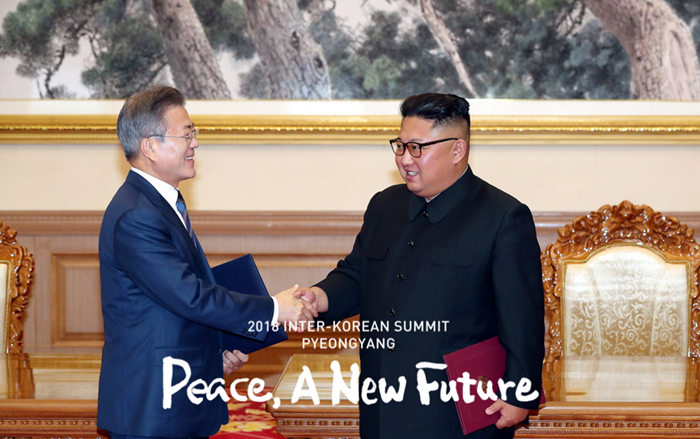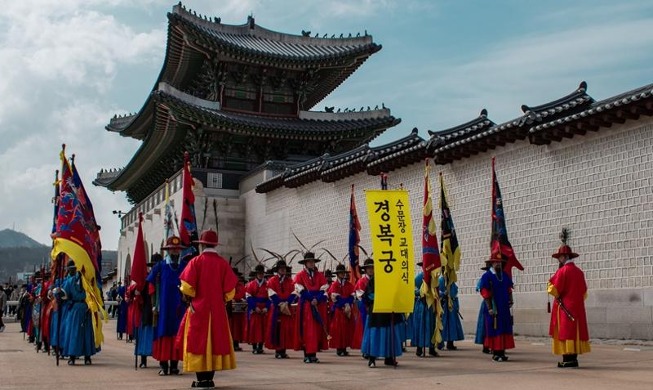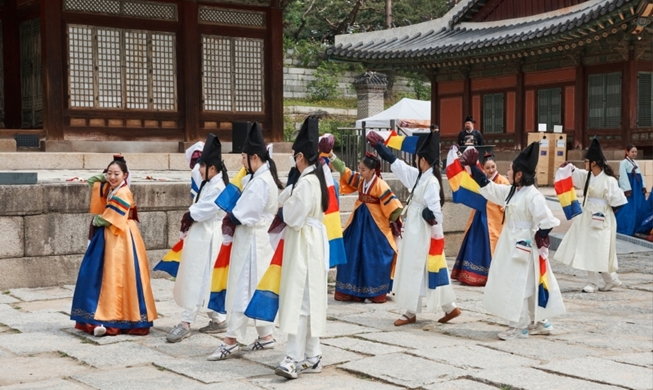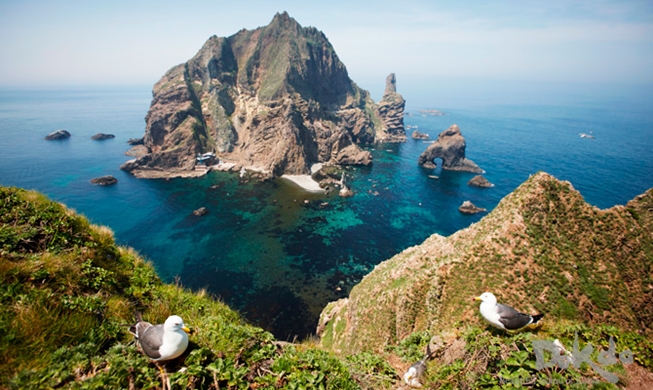-
 Korea.net's 24-hour YouTube channel
Korea.net's 24-hour YouTube channel- NEWS FOCUS
- ABOUT KOREA
- EVENTS
- RESOURCES
- GOVERNMENT
- ABOUT US

President Moon Jae-in (left) and North Korea's Chairman of the State Affairs Commission Kim Jong Un shake hands after they sign Pyeongyang Joint Declaration at Baekhwawon State Guesthouse on Sept. 19. (Pyeongyang Press Corps)
By Pyeongyang Press Corps
“This past spring, the seeds of peace and prosperity were sown on the Korean Peninsula. Today, this autumn in Pyeongyang, the fruits of peace and prosperity are maturing.”
So said President Moon Jae-in after having two summits in Pyeongyang with North Korea’s Chairman of the State Affairs Commission Kim Jong Un and officially announcing the Pyeongyang Joint Declaration of September 2018 on Sept. 19.
Just about a year ago, continued military threats, including nuclear weapons tests and missile launches, loomed over the Korean Peninsula. However, when President Moon suggested that North Korea participate in the PyeongChang 2018 Olympic and Paralympic Winter Games, that they march into the stadium together and form joint teams, Chairman Kim gave a positive reply in his New Year’s statement and the great journey toward peace began.
The two leaders then held a summit on April 27. They announced the Panmunjeom Declaration for Peace, Prosperity and Unification of the Korean Peninsula and immediately proceeded with the items in the agreement. They held another summit on May 26 and their two summits triggered the first-ever North Korea-U.S. summit in June.
The series of summits accelerated discussions on denuclearization and the establishment of peace on the Korean Peninsula. South and North Korea held several talks about various subjects, too, in the meantime, such as construction of infrastructure, the arts, sports, military and other social issues.
As a result, the two Koreas developed a range of cooperative projects over recent months, including joint research into connecting train tracks and roads and the joint excavation of the soldier remains in the Demilitarized Zone (DMZ). In August, the reunions for the war-separated families resumed and this allowed 170 people to see their family members again, six decades after the Korean War (1950-1953).
A liaison office for the South and the North opened inside the Gaeseong Industrial Complex in North Korea on Sept. 14, prior to the two leaders’ third summit, to allow inter-Korean communication 24 hours per day, seven days per week.
At a more person-to-person level, there were vigorous interactions among athletes starting at the PyeongChang 2018 Winter Games in February and March. In May, a joint table tennis team attended the world championships in Sweden. In July, the two Koreas hosted a joint basketball match and formed joint table tennis teams for the 2018 ITTF World Tour Platinum Korea Open. In August, an inter-Korean workers’ soccer match was held, and North Korean athletes participated in the International Shooting Sports World Championship in Changwon, South Korea. Additionally, athletes from the two Koreas marched together in the Opening and Closing ceremonies at the 2018 Jakarta-Palembang Asian Games, and made joint teams for three sports.
President Moon Jae-in is visiting Pyeongyang in the autumn, as he promised to do in his prior summit with his North Korean counterpart, and announced the Pyeongyang Declaration on Sept. 19. The declaration includes denuclearization measures, such as a permanent shut-down of the Dongchang-ri missile facilities and economic development measures, such as a groundbreaking ceremony for connecting train tracks and roads. Moreover, Chairman Kim promised to visit Seoul in the near future, which will be the first visit by North Korea’s supreme leader to the southern capital.
The smooth flow of events on the Korean Peninsula seemed to halt as Pyeongyang and Washington had different opinions regarding the process of denuclearization and the declaration of an end to war. There were rising concerns when the U.S. Secretary of State Mike Pompeo suddenly canceled his visit to the North in late August. However, the Inter-Korean Summit Pyeongyang reignited the journey toward denuclearization and toward the establishment of peace on the Korean Peninsula.
The positive mood surrounding the inter-Korean relationship, which began with spring flowers, is now coming to fruition in autumn.













